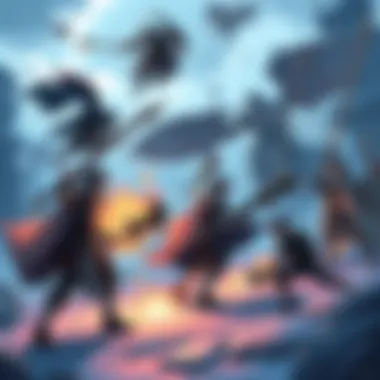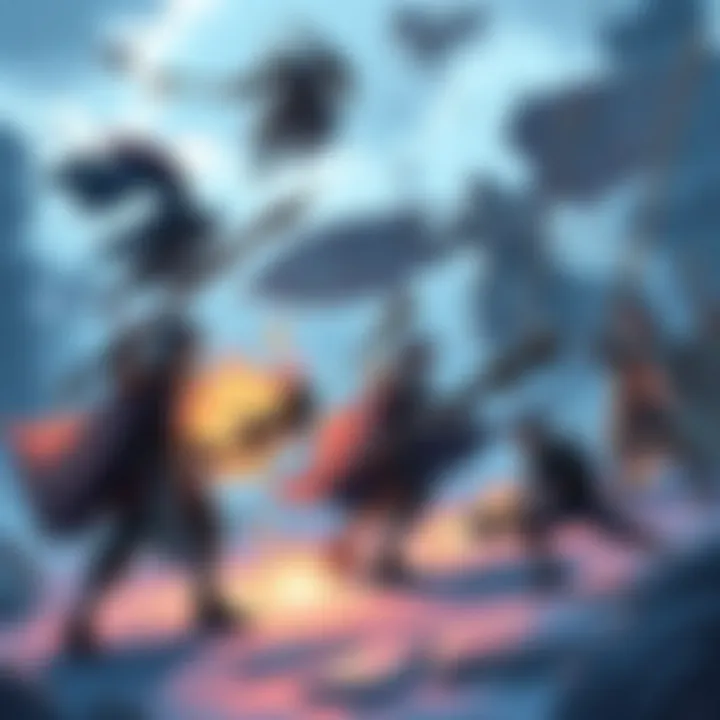Top Multiplayer RPGs to Enjoy With Your Friends


Intro
When it comes to gaming, experiencing adventure and storytelling with friends takes the fun to a whole new level. Role-playing games (RPGs) are particularly well-suited for this kind of team engagement, offering rich narratives and deep worlds to explore together. Imagine gathering around a screen, wielding swords, casting spells, or embarking on epic quests as you strategize and cooperate in real-time, sharing both triumphs and setbacks. It's not just about gameplay; it's about relationship building, inside jokes, and shared memories that can last a lifetime.
In the world of RPGs, players can dive into various settings, whether imagining themselves as valiant knights in a medieval kingdom or clever space captains navigating distant galaxies. Some games focus on character development while others emphasize exploration or tactical battles, giving players the freedom to choose how they want to contribute to the group dynamic. This flexibility makes RPGs incredibly appealing and increases their replay value.
Throughout this article, we will examine a variety of RPGs that stand out in the multiplayer realm. Not only will we cover gameplay dynamics and social interactions, but also platforms available and key features that truly enhance the shared gaming experience. From battling together against formidable foes to engaging in political intrigue with your friends, these games have something for everyone.
Ultimately, our goal is to provide you with a thorough overview of the best RPGs for group play so that your next adventure with mates can be as exciting and memorable as possible.
"In RPGs, it's the journey you take together that defines your adventure."
So, grab your swords or spell books, rally your friends, and embark on an unforgettable journey!
Prelims to Cooperative RPG Gaming
Cooperative role-playing games (RPGs) offer players a unique blend of strategy, teamwork, and immersive storytelling. This section serves as a gateway into understanding why cooperative RPG gaming deserves your attention, especially if you're looking to enhance your gaming experiences with friends. Cooperative RPGs are not just about battling foes or leveling up; they are about creating memorable experiences.
Creating Connections Through Gameplay
When friends gather round for a gaming night, they are often searching for something that goes beyond mere competition. The cooperative nature of RPGs cultivates a sense of camaraderie. As players navigate challenges together, they forge bonds, celebrate triumphs, and sometimes even share a laugh over a disastrous in-game decision. This social aspect of RPGs makes them particularly appealing for groups of friends, as the game becomes a shared narrative rather than just a series of independent player experiences.
Another crucial point of cooperative RPGs is the diversity in gameplay styles they offer. Each character can have unique skills and attributes, leading to different strategic approaches in combat scenarios. Friends can explore collaborative strategies, ensuring that everyone has an essential role to play in the gaming experience.
The Role of Story in Cooperative Play
RPGs excel in narrative storytelling, which delights tech-savvy players always looking for diverse and rich plotlines. In many RPGs, the narrative is not only designed to draw players in but also allows them to leave their mark on the unfolding story. Players can often make choices that impact the outcome, increasing engagement and investment in the game's world. These types of narrative techniques heighten the overall experience and encourage discussions among friends about the decisions they made.
Understanding RPGs
Role-playing games act as digital canvases where players step into the shoes of characters, often in richly developed fantasy or sci-fi worlds. At its core, RPGs hinge on players immersing themselves in character roles and stories, often requiring imagination and creativity. Traditional RPGs utilize dice and character sheets, transporting players into fantastical realms where they can engage in epic battles or solve intricate puzzles.
Role-playing has deep roots, extending back to tabletop games like Dungeons & Dragons. When adapted to digital platforms, the format transformed—incorporating visually stunning graphics and complex storylines that can rival major motion pictures. For tech-savvy individuals, this fusion of storytelling, strategy, and interactive gameplay creates endless possibilities.
RPG gameplay mechanics often blend exploration with combat, forcing players to navigate vast landscapes while managing resources. This marries the need for creativity with tactical decision-making, offering layers of complexity in gameplay.
The Significance of Multiplayer
Multiplayer features are the linchpin of cooperative RPGs. Unlike solitary experiences, multiplayer RPGs establish a social framework that enhances the overall enjoyment and challenge. Friends can band together to tackle formidable quests or engage in thrilling PvP battles, creating a competitive yet cooperative atmosphere.
"A journey shared is a journey doubly enjoyed."
With many games, successful navigation through challenges hinges on teamwork. Effective communication during missions heightens the stakes and can significantly affect the outcome of battles. While navigating a dungeon, players might need to articulate their strategies quickly and clearly, creating a natural dialogue that deepens social connections.
Furthermore, multiplayer aspects encourage players to strategize and create roles for each member of their party. One friend might play the heavy-hitter, while another serves as the healer, demonstrating the need for synergy and planning. This intelligent collaboration can transform any gaming session from mere entertainment into an engaging bonding experience.
Factors to Consider in Multiplayer RPGs
When diving into the realm of multiplayer RPGs, it's crucial to understand what makes these experiences worthwhile, especially when sharing them with friends. This segment sheds light on the essential factors that can elevate a gaming session from mediocre to memorable. Paying attention to these elements ensures that players not only enjoy the gameplay but also foster deeper connections and satisfaction.
Game Mechanics and Design
The foundation of any good RPG lies in its mechanics and design. These aspects shape how players interact with each other and the game world. In multiplayer RPGs, the mechanics are often tailored to facilitate cooperation or competition—both can bring a unique flavor to your gameplay experience.
For instance, take a game like Divinity: Original Sin 2. Its turn-based combat system encourages strategic planning among players, allowing friends to collaborate on intricate plans or even engage in rivalry. Players can control multiple characters, each with unique abilities, prompting teamwork and a sense of collective ownership. If one player dives headfirst into battle without communication, the repercussions may ripple through the entire team. Here, game design directly impacts the enjoyment of your gaming crew.
Key Points on Game Mechanics:
- Cooperation vs. Competition: Does the game push players to work together, or does it create an environment ripe for friendly rivalry?
- Accessibility of Mechanics: Are the systems straightforward enough for newcomers or do they require a steep learning curve?
- Balance: While challenge is pivotal, overly punishing mechanics can frustrate players and dampen the group's enthusiasm.
Narrative Depth and Engagement
Not every RPG prioritizes a rich narrative, but those that do often create a more immersive environment. When friends are engaged in a compelling story, it fosters discussions, debates, and a shared investment in the outcome of the game. Final Fantasy XIV, for example, combines a captivating story with rich lore, encouraging players to delve into the backstory and motivations of characters. This collective journey not only solidifies friendships but also invites players to explore and speculate together.
A game’s ability to weave an engaging tale can lead to standout moments, like defeating a boss that has been a shared pain point or uncovering hidden lore through side quests. These experiences create shared memories, which are valuable in solidifying friendships.


Narrative Engagement Considerations:
- Story Complexity: Does the plot cater to diverse player interests?
- Character Development: Are characters relatable, allowing players to forge emotional connections?
- Questing Styles: Are side quests meaningful, providing additional depth to the main narrative?
Player Interaction Dynamics
Player dynamics go a long way in shaping the multiplayer experience. The interactions between players—whether cooperative, competitive, or even chaotic—dictate how enjoyable a game becomes. A game like Monster Hunter: World exemplifies this well with its focus on teamwork, where players work together to take down colossal beasts. Communication is paramount, and the game even features built-in systems for players to signal each other, building camaraderie and synergy.
It's not just about slaying monsters, though. Sometimes, players can share technical skills, like cooking up potions or fashioning new gear, enhancing engagement. Having these dynamic elements in place allows groups to bond over challenges and achievements, turning even the most mundane missions into memorable adventures.
Considerations for Interaction Dynamics:
- Communication Tools: Are there effective tools in-game for coordinating among teammates?
- Role Specialization: Can players find their niche, whether as healers, damage dealers, or defenders, adding layers of strategy?
- Community Building Features: Are there forums or guild systems that support community interaction outside of the gameplay?
"The strongest bond is forged in the fires of experience, where challenges and triumphs are shared, solidifying friendships beyond the screen."
As we continue exploring the landscape of multiplayer RPGs, these factors will help you identify which games to dive into next with friends. Understanding how mechanics, stories, and player dynamics play out will serve to make every gaming session a step toward unforgettable experiences.
Classic RPGs Worth Exploring
Classic RPGs play a pivotal role in shaping the landscape of multiplayer gaming. These games not only offer an enchanting dive into rich worlds but also lay the groundwork for the cooperative adventures that friends can embark on. The nostalgia of these titles is coupled with gameplay mechanics that foster camaraderie—whether it's banding together to conquer formidable foes or sharing the thrills of unraveling intricate storylines.
The significance of engaging with classic RPGs lies in their timeless appeal and the enduring bonds they create among players. They serve as a bridge connecting varied generations of gamers, inviting both veteran players and newbies to explore vast realms together. The depth in their narratives and character development is unparalleled, allowing groups to share experiences that linger in memory long after the console is switched off.
Additionally, classic RPGs often prioritize strategy and teamwork, compelling players to communicate and collaborate effectively. This encourages not just in-game synergies but also fosters real-world friendships. Aspects such as character choices, moral dilemmas, and the need for collective problem-solving make these games an invaluable part of any gamer’s library.
Baldur's Gate Series
The Baldur's Gate series stands tall as a hallmark of classic RPGs that is particularly beloved for its rich storytelling and comprehensive character development. Set in the Dungeons & Dragons universe, it offers a deep fantasy landscape infused with lore that invites players to immerse themselves in a world both familiar and thrilling.
One of the series’ standout features is its engaging turn-based combat system, which ensures that every twitch of strategy counts. Players can form parties, each with their unique abilities and personalities, enhancing cooperative gameplay. The choice of party composition adds layers to the strategy, allowing for meaningful interactions and evolving dynamics among players. When friends join forces to tackle the various quests, it’s not just about winning battles but also forming lasting bonds through shared decision-making.
Additionally, the dialogue options and story arcs in the Baldur’s Gate series lead to different game outcomes based on player choices. This adds replayability and means that every session can feel fresh as players explore alternative paths together. The graphics may appear dated compared to modern standards, but the spirit of adventure and discovery remains timeless.
Final Fantasy
Final Fantasy XIV reshaped the MMORPG genre, blending classic RPG elements with a contemporary focus on social interaction. Set in the vibrant Eorzea, it offers players an expansive world filled with quests, captivating storylines, and the opportunity to combat formidable threats alongside friends.
What sets Final Fantasy XIV apart is its seamless integration of character customization and class switching. Players can develop their avatars according to personal preferences, switching jobs that can fit the context of group play. This encourages collaboration as players can pick roles that emphasize teamwork, whether that’s tanking, healing, or dealing damage. The expansive content updates mean that there’s always something new for players to tackle together, from massive raids to seasonal events.
Furthermore, it places a strong emphasis on community engagement. In-game communication and guild systems foster a culture of collaboration, allowing players to build and strengthen friendships outside the confines of battles. Watching your friends grow alongside you in levels, skills, and gear creates a sense of shared accomplishment that’s hard to replicate elsewhere.
Modern Multiplayer RPGs
Modern multiplayer RPGs have become a cornerstone in the landscape of gaming, knitting together intricate worlds with avenues for social interaction. These games are not just about leveling up or completing quests; they meld storytelling and mechanics with collaboration, allowing friends to embark on adventures together, celebrate victories, and strategize against formidable foes. The sheer variety of experiences that modern multiplayer RPGs offer caters to diverse player preferences, from the casual gamer to the hardcore strategist.
Genshin Impact
Genshin Impact stands as a testament to how visual artistry and immersive gameplay can attract a broad audience. Set in the enchanting world of Teyvat, this action RPG introduces players to a vibrant universe filled with elemental magic and sprawling landscapes. A key feature of the game is its co-op mode, which allows up to four players to traverse the world together, solving puzzles and facing mythical creatures. The character-switching mechanic adds a layer of tactical depth, enabling players to tailor their strategies to the challenges they encounter. Whether you're tackling the fierce bosses that roam the wilds or engaging in casual exploration, Genshin Impact has something for everyone. Players have often expressed how the game allows for bonding over common quests or sharing insights on which character combinations yield the best results.
Divinity: Original Sin
Divinity: Original Sin 2 is a crowning jewel in the realm of tactical RPGs, offering a blend of remarkably deep storytelling and rich character development. Here, choices genuinely matter. As players embark on their journey, decisions made during encounters—be it combat or dialogue—are pivotal and can alter the game’s trajectory significantly. This encourages players to discuss strategies and outcomes among their group, making it perfect for shared gaming sessions. The turn-based combat system is intricate and engaging, requiring collaboration and careful planning. For instance, pairing characters with complementary abilities can lead to spectacular defeats of enemies that many might find daunting alone. The game's flexibility encourages players to experiment, enhancing not just in-game performance but also the bond formed through shared experiences.
Monster Hunter: World
In the action RPG realm, Monster Hunter: World has created a unique niche. This title invites players to step into the shoes of a hunter capable of taking down colossal adversaries. Its multiplayer aspect thrives on teamwork, as groups can work together to bring down formidable beasts, each with distinctive behaviors and weaknesses. Here, synergy among players becomes fluid as hunters choose roles that capitalize on their chosen weapons and abilities. The dynamics of combat and resource gathering foster a sense of community, as players often discuss best practices for taking down specific creatures. There's an unmistakable thrill in strategizing what gear or traps to bring to a hunt. Furthermore, the ever-evolving endgame content keeps players engaged, creating a sense of ongoing community interaction beyond just gameplay.
"In multiplayer RPGs, the camaraderie formed can turn a simple evening into a memorable adventure that lingers long after the game is over."
These modern titles highlight the evolving nature of RPGs, emphasizing storytelling, gameplay mechanics, and, importantly, the social connectivity that defines these gaming experiences. Players not only share in the challenges present in the game world but also in the laughter, frustrations, and triumphs that come with playing alongside friends.
Distinctive Features of Top RPGs


The world of RPGs is vast and diverse, making it crucial to spotlight distinctive features that aren't just makeup but are fundamental to the overall experience when playing alongside friends. These features generally can shape both the gameplay itself and the atmosphere of camaraderie. Playing an RPG together isn't just about rolling dice or completing quests; it’s about building narratives and memories together. Important elements like world-building, character development, and combat systems each carry their weight, contributing to an engaging multiplayer experience.
World-Building and Exploration
When it comes to world-building, it’s about more than just pretty landscapes and expansive maps—it's about creating a living, breathing universe where players can immerse themselves. For instance, in The Witcher 3: Wild Hunt, the world feels incredibly rich with history and lore. When players explore these environments together, they aren't just clicking through menus; they are part of a shared adventure, uncovering secrets and quests that make each exploration session unique.
Think about how discovery fuels friendships; that unexpected find or hidden gem in a game can lead to countless discussions and debates, strengthening bonds. Games like Elder Scrolls Online factor in robust narrative elements, allowing players to dive deep into quests that span the whole game world, ensuring that no two sessions are ever the same. There’s something immensely rewarding in discussing strategies to tackle open-world challenges, or simply enjoying the scenery along the way.
Character Customization and Development
Character customization is another pillar that elevates the role-playing experience. It’s not just about aesthetics; it's about identity. In titles such as Divinity: Original Sin 2, players can mold their characters in terms of skills, appearances, and backstories. When your friends know your character's unique skills and traits, it adds a layer of strategy to your gameplay. No longer are you just a faceless hero; you become part of a team with distinct roles, much like a sports team.
Furthermore, the developmental aspect keeps players invested. As characters grow through levels and new abilities, there’s a gratifying sense of progress. You’re not just farming experience points; you’re crafting your journey together, complete with discussion about how to optimize each character's roles in the group. This customization sparks conversations that extend beyond the game, into real life, where you compare experiences and choices made within the game.
Combat Systems and Strategies
RPG combat can dictate the flow of each session, particularly when friends are involved. Think of games like Monster Hunter: World, where strategic collaboration is key. You cannot simply run in guns blazing; teamwork, timing, and tactical thinking make all the difference. When players take different roles in combat—tank, damage dealer, support—they form a well-oiled machine.
Increased difficulty levels or challenging boss fights can lead to thrilling moments where every decision is pivotal. Those nail-biting encounters often end up as stories you share long after the gaming session ends. In combating foes, the coordination and communication become vital, as players often devise plans that require quick thinking and adaptability.
Final thought: The combat system is a pivotal element that not only entertains but strengthens bonds through shared challenges and victories.
In closing, the distinctive features of top RPGs contribute significantly to the overall multiplayer experience. Each element, from world-building to combat strategies, cultivates a shared narrative that not only enriches gameplay but also forms lasting friendships.
Social Aspects of RPGs
In an age where digital engagements often replace face-to-face interactions, the significance of social aspects in role-playing games (RPGs) becomes increasingly apparent. Multiplayer RPGs attract groups not just because of their captivating worlds or complex storytelling, but because they facilitate genuine connections between players. Games like Divinity: Original Sin 2 or Final Fantasy XIV become more than just a means for entertainment—they evolve into platforms where friendships can blossom. Let’s dive deeper into how these games contribute to social bonding and collaboration among friends.
Building Friendships Through Play
One of the most compelling elements of cooperative RPGs is their ability to foster friendships. Shared experiences, whether it's overcoming a challenging quest in Monster Hunter: World or strategizing together to defeat a challenging boss in Genshin Impact, create a bond that often transcends the gaming experience. When players collaborate, they learn about each other's strengths and weaknesses, allowing them to form a cohesive team dynamic.
- Communication: Effective gameplay relies on teamwork. Players must exchange strategies or share resources, which can lead to deep discussions that strengthen friendships.
- Celebrating Victories Together: Achievements, whether big or small, resonate more powerfully when shared with friends. Beating a tough dungeon or completing a complex mission becomes a memorable milestone that players can reminisce about.
- Creating Lasting Memories: The immersive nature of RPGs adds layers to these experiences. The stories we encounter weave into our own narratives, with memorable moments often shared during later conversations. This joint storytelling enhances the emotional investment in the friendship.
"Multiplayer RPGs are not just a game; they are a nuanced experience that reflects the dynamics of our friendships."
In-Game Communication Trends
Communication in multiplayer RPGs has evolved significantly. Early systems may have depended heavily on voice chats, but today's games often integrate varied methods for players to connect and strategize. In Final Fantasy XIV, for instance, players use both text and voice communication, fostering not just tactical discussions but also socializing.
- Text Chat Features: Many RPGs include customizable text chat options that allow players to express emotions through symbols or gifs, enriching the interaction.
- Voice Chat Integrations: Platforms like Discord have become essential for many gaming communities. Players utilize these tools to communicate even outside the game, enhancing their friendships through extended interactions.
- Emotes and Gestures: In-game tools that allow players to express their emotions non-verbally have gained popularity. They enable quick, clear communication during intense moments in the game.
Resources:
Platforms for RPG Gameplay
When it comes to enjoying RPGs with friends, the platform you choose to play on can greatly influence the overall experience. Each platform brings its unique set of advantages and challenges, which can either enhance your gaming sessions or introduce barriers to enjoyment. Understanding these platforms is crucial, especially when you aim to maximize your multiplayer gaming time.
Consoles vs. PC
The age-old debate between consoles and PC continues to be relevant for multiplayer RPG gaming. On one side of the fence, you have consoles like PlayStation and Xbox, which offer the ease of plug-and-play gaming. They are generally more user-friendly, requiring minimal technical know-how. Jumping into a new game, especially with a group, can be done in a jiffy. Multiplayer experiences on consoles often come with built-in features like voice chat and friend lists, allowing for seamless communication.
However, this simplicity comes at a price—both figuratively and literally. Consoles tend to be less flexible regarding hardware upgrades. Once you buy a console, you're using the same specifications for a generation before needing to upgrade. Graphics and frame rates can be less impressive compared to a well-equipped PC.
On the other hand, gaming on a PC provides a robust and versatile experience. Players can customize their rigs, upgrade components, and run games at higher settings for improved visuals and smoother gameplay. For some RPGs, modding capabilities on PC can bring a new layer of depth and excitement. The modding community often introduces new content and features, enhancing replayability.
Despite these benefits, PC gaming can have a steep learning curve. Not everyone is comfortable troubleshooting technical issues or navigating various launchers, platforms, and updates. This technical barrier can frustrate some users and may deter a casual gamer who just wants to connect with friends and dive into an adventure.
In the end, the choice between console and PC often comes down to personal preference and willingness to adapt. It's worth recognizing that cross-play functionality is becoming standard in several modern RPGs. This means that players on different platforms can join together, allowing you to enjoy the game you love without worrying too much about the system your friends are using.


Mobile Gaming Opportunities
Mobile gaming has carved out a niche for itself in the RPG world, providing unique avenues for social interaction. Imagine you’re on a bus or waiting in line, and your friends are just a quick tap away. Modern smartphones are powerful enough to support engaging RPGs that can be played on-the-go. This means you can squeeze in quick sessions or lengthy adventures, all from your pocket.
Games like Raid: Shadow Legends offer unique mechanics specifically tailored to mobile play. They often feature shorter play sessions which are perfect for casual gaming with friends. You’re not anchored to a console or locked in at home—anytime you have a few spare moments, the world of RPGs is right at your fingertips.
One of the main downsides here, though, tends to be the pay-to-win model that many mobile games adopt. While engaging with friends can still be enjoyable, the experience can sometimes be overshadowed by in-game purchases and ads. Not all mobile RPGs offer the same depth of gameplay as their console or PC counterparts, but that doesn’t mean they aren’t worth exploring.
Ultimately, mobile gaming offers flexibility. It enables you to connect with friends who might not have the time to dedicate to a long gaming session on the PC or a console. It breaks geographical boundaries and fosters collaborative play in a way that was once unimaginable.
"The platform can define your play style, but it's the friends you share it with that create memorable adventures."
This nuanced understanding of the different platforms allows players to make informed choices when deciding where to embark on their next RPG escapade. Embracing the diverse gaming ecosystem, from console setups to mobile play, can vastly improve the multiplayer RPG experience and forge connections that last long beyond the gaming session.
Emerging Trends in Multiplayer RPGs
The landscape of multiplayer RPGs is evolving rapidly, embracing elements that not only enhance gameplay but also foster player collaboration and connection. As technology advances, these trends shape the way gamers experience and enjoy role-playing games with friends. Understanding these developments is crucial for players looking to maximize their enjoyment and engagement within any multiplayer RPG. Let’s delve into some key trends making waves in this exciting genre.
Cross-Platform Play
Cross-platform play is revolutionizing how gamers interact within the virtual world. With this feature, a gamer on a PlayStation console can team up with a pal on an Xbox or even a PC, creating a seamless gaming experience. Imagine your friend preferring their trusty gamepad while you wield a keyboard and mouse. This inclusivity breaks down barriers that previously separated players based on their platform of choice.
The benefits of cross-platform play are significant:
- Wider Player Base: This means you can gather more friends for your gaming adventures, increasing matchmaking options and reducing wait times.
- Flexibility in Gameplay: Players are no longer shackled to a single console, allowing for greater freedom to play wherever and however they feel comfortable.
- Community Growth: Communities around these games become more robust and diverse, as players share strategies and experiences across various platforms.
Notable games promoting cross-platform play include Fortnite, Call of Duty: Modern Warfare, and Rocket League. These titles not only encourage diverse group dynamics among friends but also pave the way for a future where players enjoy RPGs without hardware restrictions.
Whether you’re strategizing in a fast-paced dungeon crawl or embarking on a narrative-rich quest, knowing that your friends can join in from different platforms adds another layer of excitement to the RPG realm.
Evolving Gaming Communities
With the rise of online connectivity, gaming communities are evolving at an extraordinary pace. Once, multiplayer games were primarily about playing with friends; now, they encompass immense social networks where players from around the world can converge. This has altered the way groups form, create strategies, and interact.
Key features of these evolving communities include:
- Community Forums and Social Media Groups: Websites like reddit.com and dedicated Discord servers allow players to connect over shared interests, swap tips, and organize in-game events with ease.
- User-Generated Content: Many RPGs now allow players to create their own content—quests, characters, or even entire worlds. This empowers players and strengthens the sense of community.
- In-Game Events: Developers create special events or seasonal updates that motivate communities to participate. Such events might include in-game festivals or tournaments that encourage teamwork and friendly competition.
As these communities flourish, they add an unmeasurable depth to the multiplayer experience. Players bond over shared victories and defeats, helping to cement friendships and yielding lasting memories.
"Games may change, but the bonds formed in battle last a lifetime."
Ending and Recommendations
In concluding our journey through the realm of multiplayer RPGs, it’s vital to highlight the significance of selecting the right game for a shared experience. This recommendation is not just about the gameplay itself, but also how it intertwines with the social fabric of friendship. RPGs offer an interactive canvas where stories unfold based on player decisions, where strategizing with friends becomes integral to success, and where a shared laugh over a game mishap can strengthen bonds.
When recommending games for a group of friends, we should consider a mix of immersive narratives, engaging mechanics, and accessibility across different platforms. Look for titles that not only challenge players but also support cooperation and communication. A well-suited RPG can transform just another gaming night into a memorable adventure.
For instance, Divinity: Original Sin 2 leads players through intricate narratives and tactical battles, making teamwork crucial. Genshin Impact invites casual exploration together, allowing players to share experiences without the weight of high stakes. Finding games like these makes all the difference in fostering camaraderie among friends.
Consider also the technical facets: whether everyone has compatible consoles or PCs, or if certain games facilitate cross-platform play. This affects accessibility and can either invite more friends to join or limit the fun to a select few. Thus, thoughtfully assessing these dynamics ensures a smoother and more enjoyable experience for everyone.
In this space of games, the right choice matters greatly. While you might dive into the latest flashy release, don’t underestimate the gems that have defined cooperative RPG experiences for years. The value of shared storytelling and mutual achievement in gaming can't be overstated. Grab your controllers, gather your friends, and let the adventures begin!
Best RPGs for Friends
When it comes to shared adventures, some RPGs shine brighter than others. Here are a few standout titles that promise to elevate your gaming nights:
- Baldur's Gate 3: This latest installment in the legendary series leverages modern design to bring depth. Collaborate in rich narratives shaped by your choices.
- Final Fantasy XIV: An MMORPG masterpiece where friends forge ahead, tackling challenges together while immersed in an extensive world full of lore.
- Monster Hunter: World: Here, teamwork is key. Set out with friends to hunt formidable beasts, combining skills and strategies for triumphant quests.
- Phantasy Star Online 2: It blends action with an immersive universe. Team up or face off against others for rewards and bragging rights.
- Among Us: While not a traditional RPG, it encourages social interaction, as friends figure out together who the imposter is, adding a layer of tension and fun.
These titles embody the essence of what RPGs can offer: engaging stories and memorable moments but also a chance to collaborate, strategize, and grow as a team.
Final Thoughts on RPGs
As we wrap this exploration of RPGs tailored for friends, it’s clear that these games extend beyond mere entertainment. They become the backdrop against which stories unfold, friendships deepen, and shared adventures flourish. Multiplayer RPGs serve as a catalyst for connection in today’s increasingly digital landscape.
Whether you’re slaying dragons in a fantasy world or unearthing secrets in a sci-fi realm, the real treasure is the bonds forged along the way.
Remember, gaming isn't solely about winning; it’s about the journey you take with your companions. So gather the crew, pick an RPG that resonates, and let the collective experiences merge into an unforgettable saga. Happy gaming!



